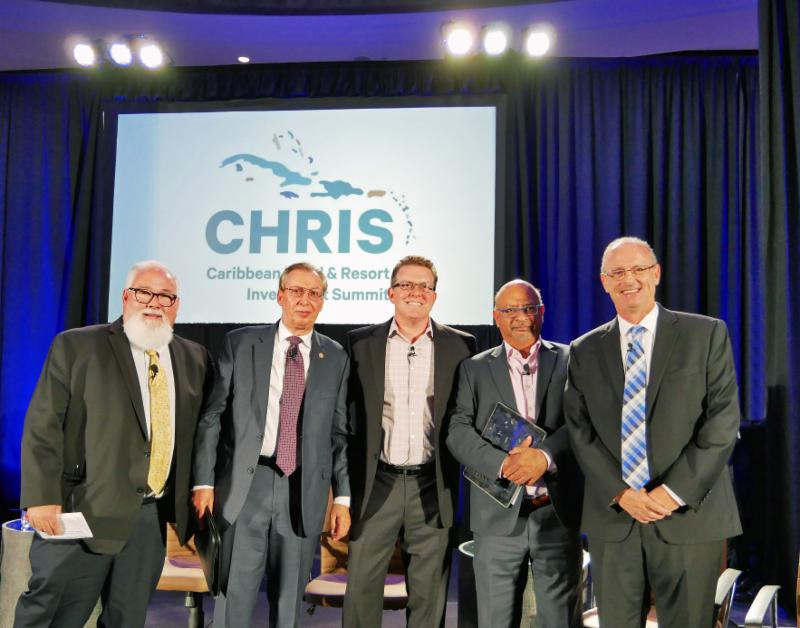US Virgin Islands Hotel & Tourism Association
 Frank Comito, CEO and Director General of the Caribbean Hotel and Tourism Association (CHTA), reassured investors that it was a great time to be in the tourism industry, which continues to be the major economic driver for the Caribbean and for the world.
Frank Comito, CEO and Director General of the Caribbean Hotel and Tourism Association (CHTA), reassured investors that it was a great time to be in the tourism industry, which continues to be the major economic driver for the Caribbean and for the world.
Speaking to the Caribbean Hotel & Resort Investment Summit (CHRIS) at the Loews Miami Beach Hotel, Comito reported that tourism is in an unprecedented growth mode with investments in new hotels and upgrades in existing properties contributing to more than one in every five new jobs being created globally. At today’s growth rate, Comito reported that tourism is expected to contribute to the creation of over 500,000 new jobs in the Caribbean alone by 2028, according to the World Travel and Tourism Council.
According to CHTA’s 2019 Industry Performance and Outlook Study, the profitability gap for Caribbean hotels is improving with four out of five hotels reporting a net profit in 2018, up from three out of four several years ago. In addition to the global economy, Comito cited the following as drivers which are stimulating new airlift and consumer demand: growing destination investments in airport infrastructure, a steady supply of new room inventory and increased investments by existing hotels in capital improvements.
Comito said the region had recovered well from the twin hurricanes that hit some Caribbean destinations with devastating consequences for the sector in 2017. However, while recovery was quick and strong in many destinations, he lamented that the region has more than 80,000 vacant hotel rooms every night. Stressing the need to boost bookings, he said that filling just 10 percent of the vacant rooms “would inject nearly US$2 billion annually into the region.”
While the vast majority of Caribbean destinations affected by the storms have bounced back, Comito observed that typically a crisis causes lingering losses as a destination falls back from its previous growth path. “Even after a destination returns to its pre-crisis level, ‘losses’ can continue to mount as it lags behind its previous growth trendline,” he noted.
Year-to-date performance data from six of the region’s destinations recovering from the 2017 twin hurricanes points to a faster than anticipated turnaround, with most hotels upgraded and reopening and international air arrivals approaching pre-hurricane levels. Comito commented: “This exceeds our expectations and speaks well to the industry’s resiliency.
Overall, the Caribbean has experienced an exceptional 2019 thus far, according to Comito, with air arrivals and hotel performances exceeding the global average. He cautioned that downturns are cyclical and that the industry must be better prepared to mitigate their impact. He presented charts showing the industry’s performance over 20 years, illustrating what has happened to visitor arrivals, hotel occupancies and hotel rates when faced with recessions, major hurricanes and a periodic health threat like Zika.
To speed up recovery and to strengthen its resilience, the CHTA head said all industry stakeholders, public and private, need to work together “to protect and enhance investments through collaboration on public relations and marketing around the Caribbean brand.”
“We’ve seen the results of collaboration, most recently last fall with the success of the ‘Rhythm Never Stops’ public relations, social and digital promotional campaign led by CHTA and the public sector-led Caribbean Tourism Organization. A handful of major companies and Caribbean destinations invested in promoting the region out of a down period. The entire region benefited. We really need to get to the point where all beneficiaries are helping to promote the region all the time. It makes us all stronger and quite frankly it’s unfair for a few to shoulder the burden when all benefit. We can do better. We shouldn’t wait for a crisis for people to come to the table,” Comito advised.
Advocating investment for the long term, Comito emphasized the importance of taking a big picture approach to Caribbean investments. He challenged more investors to look beyond the parameters of their physical investment and to work with local governments, CHTA, local hotel and tourism associations and their industry colleagues: “Your bottom line is tied to the social, environmental, political and economic environment around you.”
